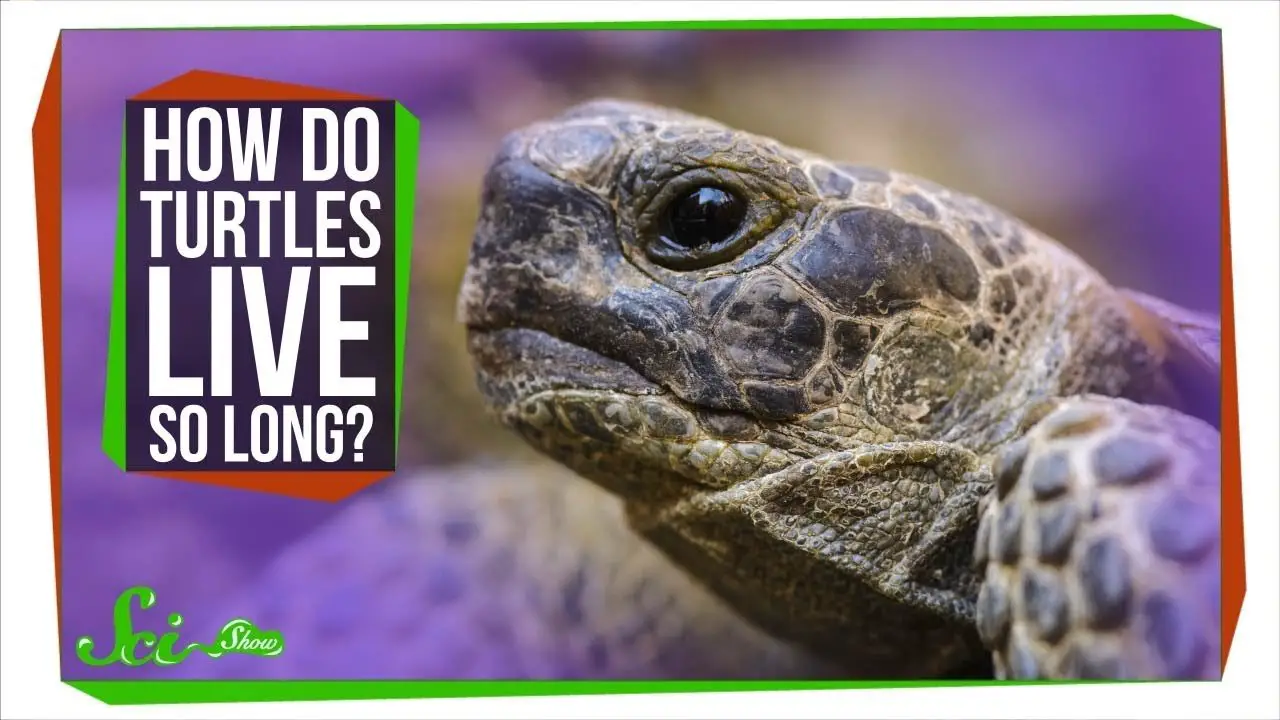Why Do Turtles Live So Long

Turtles have been around for a very long time. In fact, they are some of the oldest creatures on Earth. Scientists believe that turtles first appeared on our planet about 200 million years ago.
That means that turtles have been living on Earth for almost as long as there have been dinosaurs! So, why do these ancient creatures live so long?
Turtles are one of the oldest and most primitive animals on Earth. They first appeared on Earth over 200 million years ago, and since then they have remained largely unchanged. Their longevity is due to several factors, including their slow metabolism, low body temperature, and hard shell which protects them from predators and the elements.
One of the reasons turtles live so long is because of their slow metabolism. Metabolism is the rate at which an animal burns energy, and turtles burn energy very slowly. This is due to their low body temperature, which is only about 10 degrees Celsius above the ambient temperature (compared to 37 degrees in humans).
This low body temperature means that turtles don’t need to eat as much as other animals to maintain their energy levels, and they can go for long periods without food.Another reason turtles live so long is their hard shell. The shell protects them from predators and the elements, and also helps them regulate their body temperature.
The shell also provides support for their large internal organs, which would otherwise be susceptible to injury.So why do turtles live so long? It’s a combination of slow metabolism, low body temperature, and a hardshell that protects them from predators and the elements.
These ancient creatures have survived for millions of years thanks to these adaptations, and will likely continue to thrive for many years to come!
How Do Turtles Live So Long?
Can Turtles Live Up to 1000 Years
Did you know that turtles can live up to 1000 years? That’s right, these amazing creatures have an incredibly long lifespan and can outlive most other animals.There are many factors that contribute to a turtle’s long life, including their slow metabolism and ability to repair DNA damage.
Turtles also don’t experience the same level of wear and tear as other animals since they have a protective shell that covers their bodies.While it’s impossible to know exactly how old a wild turtle is, scientists believe that some individuals may even be able to reach 200 years old! So the next time you see a turtle, remember that this animal has been around for centuries and will likely be here long after we’re gone.
Why Do Turtles Live So Long Reddit
Turtles are one of the oldest and most primitive animals on the planet. They first appeared over 200 million years ago, and since then they have remained largely unchanged. This lack of change is likely due to the fact that turtles are very well-adapted to their environment and don’t need to change in order to survive.
One of the things that makes turtles so unique is their lifespan. While most animals only live for a few years, turtles can live for decades or even centuries! The oldest known turtle was a tortoise named Adwaita who lived to be over 250 years old.
So why do turtles live so long? There are a few theories. One theory is that because turtles grow slowly and have tough shells, they aren’t as susceptible to predators and disease as other animals.
Another theory is that because turtles don’t experience much stress in their lives, they age more slowly than other animals.Whatever the reason, there’s no doubt that turtles are one of the longest-lived creatures on Earth! If you’re ever feeling down about your own life span, just remember that there’s always a turtle out there who has you beat by several hundred years!
Lifespan of Turtle And Tortoise
Turtles and tortoises are some of the oldest creatures on Earth. Their lifespans are a testament to their evolutionary success. But just how long do these Shelled Warriors live?
Turtle lifespan in the wild can vary greatly depending on the species, but reports show that many turtles live between 30 and 40 years old. The oldest turtle ever recorded was an Aldabra Giant Tortoise named Adwaita who lived to be 255 years old!In captivity, turtles and tortoises can often outlive their wild counterparts due to better living conditions and veterinary care.
It’s not uncommon for pet turtles to reach 50 years or more with proper care. Some even make it into their 80s!So if you’re thinking about getting a turtle or tortoise as a pet, know that you could be welcoming a furry friend into your home for many decades to come.
How Long Do Pet Tortoises Live
Tortoises are one of the longest-living pets in the world, with some species known to reach an age of 100 years or more. While it’s impossible to know exactly how long your tortoise will live, there are several factors that can influence their lifespan.As a general rule, smaller tortoises tend to live longer than their larger counterparts.
This is because they have a lower metabolic rate and don’t require as much food or care. Additionally, captive tortoises usually live longer than those in the wild since they’re not subject to predators or other dangers.To help ensure your tortoise has a long and healthy life, provide them with a suitable habitat that includes plenty of space to roam, fresh water, and appropriate temperature and humidity levels.
A diet of fresh vegetables and fruits, along with occasional supplements, will also help them stay healthy and active. With proper care, your tortoise can be a lifelong companion.

Credit: www.newsweek.com
Can Turtles Live Up to 500 Years?
Turtles are one of the oldest living creatures on Earth. Some species of turtles can live up to 500 years old. The oldest turtle ever recorded was Adwaita, an Indian Ocean giant tortoise, who died in 2006 at an estimated 255 years old.
The average lifespan of a turtle is about 80 years, but this varies depending on the species. For example, sea turtles tend to have shorter lifespans than land turtles. The reason for this difference is largely due to predation and habitat destruction.
Sea turtles are often hunted for their meat and shells, while land turtles are more likely to be killed by predators or have their habitats destroyed by humans.Despite these dangers, some turtles manage to reach impressive ages. One factor that contributes to a turtle’s longevity is its slow metabolism.
Turtles don’t need to eat as much as other animals, which means they can survive off of less food and live longer as a result. Additionally, turtles produce a hormone that helps them repair damaged cells and fight off infections – another reason why they tend to live long lives.So if you’re looking for a pet that will be around for many years to come, a turtle might be the right choice!
Just make sure you do your research on proper care beforehand – these reptiles require specific conditions in order to thrive.
Why Do Turtles Last So Long?
Turtles are among the longest-lived animals on Earth. Many species of turtles can live to be over 100 years old. There are a number of reasons why turtles have such long lifespans.
One reason is that turtles have slow metabolisms. This means that they burn energy at a slower rate than other animals and so their bodies do not age as quickly. Additionally, turtles do not experience the same level of wear and tear as other animals because they move slowly and have a hard shell that protects them from injuries.
Another reason why turtles live so long is that they reproduce slowly. Turtles take many years to reach sexual maturity and they lay relatively few eggs compared to other animals. This means that there are fewer opportunities for genetic mutations that could shorten their lifespans.
It is also worth noting that turtles in captivity often live much shorter lives than those in the wild. This is due to the fact that they are subject to stressors like poor diet, lack of exercise, and living in small enclosures. These factors can all contribute to a shortened lifespan.
Why Do Tortoises Live a Long Life?
There are many reasons why tortoises live a long life. For one, they have a very slow metabolism, which means that their bodies don’t wear out as quickly as other animals. They also don’t have to worry about predators or diseases, since they’re so slow-moving that most animals can’t catch them and their shells offer them good protection against disease.
Additionally, tortoises live in arid environments where food is scarce, so they’ve evolved to be able to survive on very little food and water. Finally, tortoises reproduce slowly and late in life, which reduces the number of times their cells divide and thus lowers their risk of developing cancer. All of these factors together add up to give tortoises an impressive lifespan; some species can live for over 150 years!
Do Turtles Move Slowly Because They Live Longer?
The turtles’ slow movement secrets have nothing to do with their lifespan. While turtles are known for their leisurely pace, it is mostly attributed to their anatomy and need for energy conservation. Their long lifespans result from various other factors such as their ability to resist diseases and their slower metabolic rates.
Can a Tortoise Live for 300 Years?
It is difficult to say how long a tortoise can live for as there are many variables to consider, such as the species of tortoise, the care it receives and its environment. Generally speaking, however, it is not uncommon for a tortoise to reach an age of 100 years or more. There have been reports of individual tortoises living for over 200 years, and in one case, a tortoise was documented to have lived for nearly 300 years.
The oldest recorded tortoise was an Aldabra giant tortoise named Adwaita who was brought to Calcutta Zoo in India in 1875. He was believed to be around 250 years old when he died in 2006. Another notable example is a Galapagos turtle named Harriet who was discovered by Charles Darwin on his famous voyage aboard the HMS Beagle.
When she died in 2006 at an estimated 176 years old, she was the oldest known vertebrate animal in the world.While these examples show that it is possible for a tortoise to live a long life, it should be noted that they are both outliers and may not be representative of the average lifespan of their respective species. In general, however, it is safe to say that a healthy tortoise can expect to live for several decades if properly cared for.
Conclusion
In a new study, scientists have discovered that turtles may live so long because of a unique mechanism in their cells that helps to repair damage caused by oxidative stress.Oxidative stress is a type of cellular damage caused by the presence of too many free radicals in the body. Free radicals are unstable molecules that can cause damage to DNA and other important cellular components.
The new study found that turtles have higher levels of an enzyme called telomerase than other animals. Telomerase helps to repair damaged DNA, and the researchers believe that this may be one reason why turtles are able to live so long.The findings suggest that boosting levels of telomerase could help to protect against some of the effects of aging in humans.
However, it is important to note that more research is needed before any definitive conclusions can be drawn.